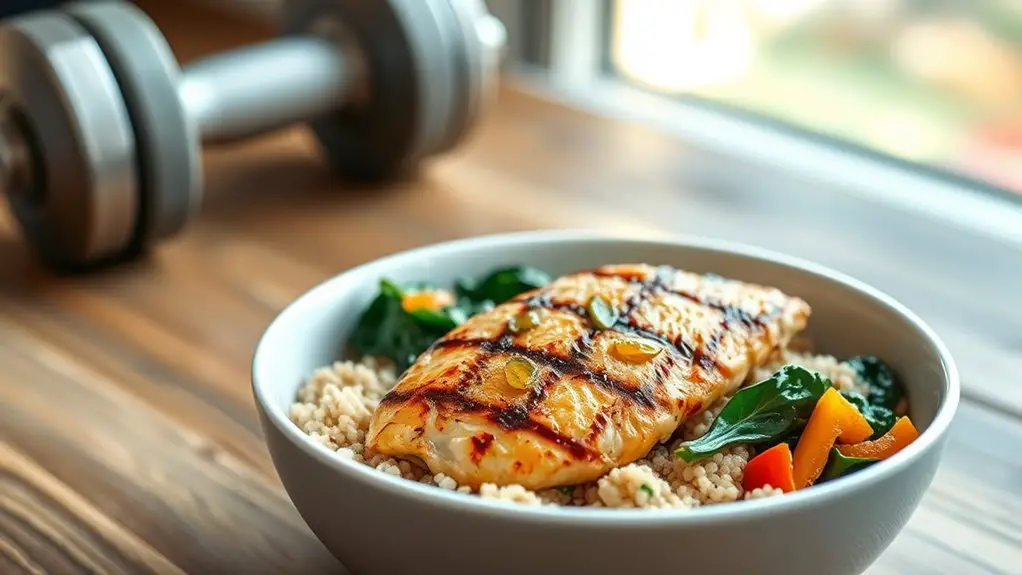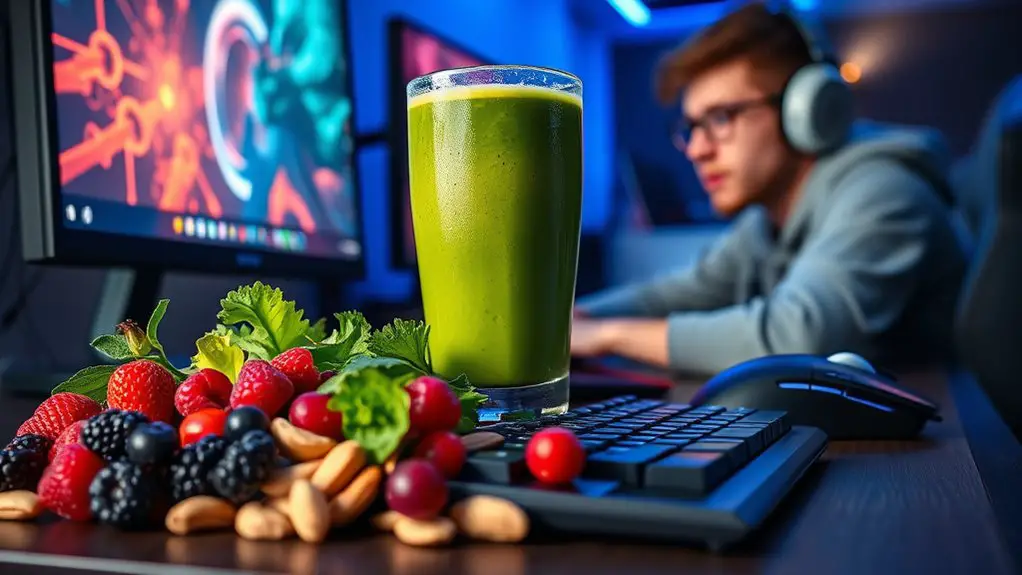Protein's essential for your muscle recovery. It repairs damaged fibers, reduces soreness, and boosts strength and performance after workouts. You'll want to aim for 1.2 to 2.0 grams of protein per kilogram of your body weight daily, especially if you're active. Lean meats, beans, and dairy are excellent sources. Remember, recovery also involves hydration and other nutrients. If you keep exploring, you'll discover more tips on optimizing your recovery and performance.
Understanding Muscle Recovery
When you push your body during workouts, it's essential to understand how muscle recovery works. Recovery isn't just about resting; it's a dynamic process that helps you regain strength and avoid injury. After intense exercise, your muscles need time to heal from the tiny tears caused by exertion. This healing phase is when your muscles grow stronger, allowing you to reach new heights in your fitness journey. Prioritizing recovery means listening to your body, ensuring you get enough sleep, hydration, and active rest. Remember, it's not just about the grind; it's about nurturing your body for the long haul. Embrace this process, and you'll find the freedom to push harder, knowing your body is primed and ready for the next challenge.
The Role of Protein in Muscle Repair
After putting your muscles through rigorous workouts, it's important to fuel their recovery effectively. Protein plays an essential role in repairing muscle fibers that get damaged during exercise. When you consume protein, your body breaks it down into amino acids, which are critical for muscle repair and growth. This process helps reduce soreness and accelerates your recovery time, allowing you to get back to what you love sooner. Plus, having adequate protein can enhance your strength and performance in future workouts. So, think of protein as your body's way of rebuilding and fortifying those hard-working muscles. By prioritizing protein in your post-workout routine, you're giving yourself the freedom to push your limits and enjoy the benefits of your efforts.
Recommended Daily Protein Intake
Determining your recommended daily protein intake is essential for optimizing muscle recovery and overall health. Generally, a good rule of thumb is to aim for about 1.2 to 2.0 grams of protein per kilogram of body weight, depending on your activity level and fitness goals. If you're more active or trying to build muscle, leaning towards the higher end of that range can be beneficial. Listening to your body is key; it'll let you know if you need more or less. Remember, flexibility in your diet is important, so don't stress about hitting an exact number every day. Focus on nourishing yourself with quality protein as part of a balanced diet, and you'll likely feel empowered in your recovery journey.
Best Protein Sources for Recovery
Choosing the right protein sources can greatly enhance your muscle recovery. Lean meats like chicken and turkey are fantastic options, packed with essential amino acids. If you prefer plant-based choices, consider beans, lentils, and quinoa—they're rich in protein and fiber, helping you feel satisfied. Greek yogurt or cottage cheese can also be great post-workout snacks, supplying both protein and probiotics for gut health. Don't overlook eggs; they're versatile and loaded with nutrients. For quick fixes, protein shakes can be a convenient way to meet your needs on the go. Ultimately, the best sources are those you enjoy and can easily incorporate into your routine, allowing you the freedom to recover while still savoring your meals.
Timing Your Protein Intake
While you might already know that protein is essential for muscle recovery, the timing of your intake can greatly affect its benefits. Consuming protein at strategic moments helps maximize muscle repair and growth, giving you the freedom to train harder and recover faster.
Here's a quick reference to help you plan your protein intake:
| Timing | Recommended Intake | Benefits |
|---|---|---|
| Pre-Workout | 10-20g | Fuel and prepare muscles |
| Post-Workout | 20-30g | Kickstart recovery |
| Evening | 20g | Support overnight muscle repair |
| Throughout the Day | 1.2g/kg body weight | Maintain muscle synthesis |
| Before Bed | 20-30g | Sustain protein during sleep |
Timing your protein intake can empower your recovery and performance.
Protein Supplements: Are They Necessary?
Are protein supplements really necessary for muscle recovery? The answer isn't straightforward. While whole foods are often enough, supplements can offer convenience for those on the go. Here are some things to reflect on:
- Dietary Restrictions: If you're vegetarian or vegan, getting enough protein can be challenging.
- Time Constraints: Busy schedules may leave little time for meal prep.
- Workout Intensity: High-intensity training might demand extra protein for ideal recovery.
- Convenience: Supplements can be a quick fix post-workout when you need protein fast.
- Individual Goals: If you're aiming for specific fitness goals, supplements might help you reach them.
Ultimately, weigh your lifestyle and needs to decide what's best for you.
Combining Protein With Other Nutrients
When you combine protein with other nutrients, you can enhance muscle recovery and overall performance. Pairing protein with carbohydrates, for instance, helps replenish glycogen stores, which is essential after a tough workout. This combo fuels your muscles, allowing them to recover faster. Don't forget about healthy fats, either; they support hormone production and help reduce inflammation. Consider adding fruits or veggies to your protein shake—antioxidants from these foods can combat oxidative stress from intense exercise. Ultimately, balancing protein with these nutrients can not only speed up recovery but also empower your body to reach new heights. Embracing this holistic approach gives you the freedom to enjoy diverse meals while maximizing your fitness journey.
Common Myths About Protein and Recovery
Many people believe that simply increasing protein intake guarantees faster muscle recovery, but this isn't entirely true. Here are some common myths you should be aware of:
- More is always better: Excess protein doesn't equal better recovery. Your body can only use so much at once.
- Timing is everything: While post-workout protein is important, the overall daily intake matters more.
- Plant proteins aren't effective: Plant-based proteins can support recovery just as well as animal sources when combined properly.
- Protein alone does the trick: Recovery also depends on carbs, fats, and hydration.
- You need to consume protein right after a workout: Your body has a recovery window that lasts several hours post-exercise.
Let's debunk these myths and focus on a balanced approach for peak recovery!
Frequently Asked Questions
Can I Get Enough Protein From a Vegetarian Diet?
You'd think a vegetarian diet can't provide enough protein, right? But with beans, lentils, and nuts, you'll find it's not only possible, but you'll thrive while relishing your freedom to choose what you eat!
How Does Protein Affect Muscle Soreness After Workouts?
Protein helps repair muscle fibers, reducing soreness after workouts. When you consume enough protein, it promotes recovery, allowing you to feel less discomfort and get back to your activities quicker. You're free to keep moving!
Is There a Maximum Amount of Protein My Body Can Use?
Is there really a limit to how much protein your body can use? While it can process a good amount, excess protein might just get stored as fat, so balance is key for your freedom in nutrition.
Does Age Affect Protein Needs for Muscle Recovery?
Yes, age does affect your protein needs. As you age, your body's efficiency in utilizing protein decreases, so you might need more to support muscle recovery and maintain muscle mass than when you were younger.
Can Excessive Protein Intake Harm My Body?
Excessive protein intake can strain your kidneys and lead to dehydration. It may also cause digestive issues and nutrient imbalances. Moderation is key; listen to your body and consult a professional if unsure about your needs.




